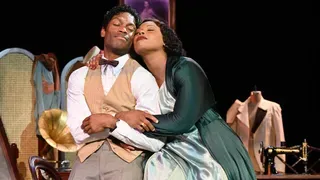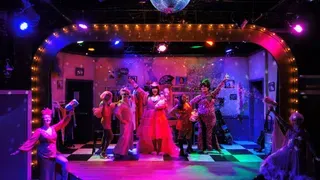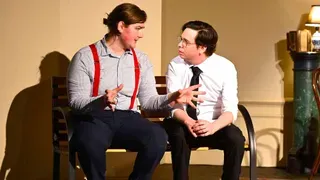May 31, 2016
Janis: Little Girl Blue
Karin McKie READ TIME: 3 MIN.
Produced by Oscar-winner Alex Gibney and written and directed by Amy J. Berg, "Janis: Little Girl Blue" tells the tragic tale of the passionate rock icon who died in 1970 at age 27.
Using archival video clips, interviews, journal entries and excerpts from letters written to her family (read by singer/actor Chan Marshall/Cat Power), the fierce and intense documentary follows Joplin's lonely youth in Port Arthur, Texas, where she was kicked out of the choir for not following directions.
Her younger sister Laura said that Janis questioned her desirability, yet "demanded to be different." Her brother Michael added that she liked rocking the boat, supporting integration in a town with an active KKK chapter.
When she was teased in high school, she became a beatnik, played the bad girl and went to Louisiana to pick fights.
She started singing at age 17 -- her voice "a surprise, to say the least," she noted -- and went to Austin to perform "hillbilly music" and the blues.
Once named "the ugliest man" by a fraternity, she "definitely felt the blues," a friend noted, and started drinking and doing drugs when she moved to San Francisco in 1963. She was unhappy, but "on stage, she felt like she was somebody."
She started fronting the band Big Brother and the Holding Company, while maintaining her "Huck Finn innocence," the child/woman ideal of the Haight, dating the Grateful Dead's Pigpen.
After seeing Otis Redding at the Fillmore, she adopted his "gotta, gotta" patter, and produced the hit "Call on Me." But her appearance at 1967's Monterey Pop Festival catapulted her into the international spotlight (especially since it was filmed and distributed, with a cutaway of Mama Cass saying "wow!"), under the tutelage and adoration of Clive Davis.
She moved to Lagunitas, California, started dating Joe McDonald of Country Joe and the Fish, and signed with Columbia Records at age 25. She hit the TV talk show circuit, often visiting Dick Cavett, with whom she became good friends (and possibly more), sometimes wearing her trademark boas in her hair.
She had a "complicated reaction to her fame," and spent time between LA and Manhattan's Chelsea Hotel. Joplin went solo, but "became a caricature of herself" yet had "emotional honesty and knew the price of losing it."
But she didn't know how to lead her new group, the Cosmic Blues Band, which sold out the Albert Hall. Singing autobiographical songs, Joplin said that being on stage was like making love, but it was an illusion.
"The audience leaves, and you're just left with yourself," she said.
It wasn't the right vibe to do heroin before a performance, she thought, but often shot up afterwards because "she could feel everybody's pain." She didn't worry about overdosing. "Nothing will happen to me," she said. "I'm of pioneer stock."
She was so stoned she was barely able to play Woodstock, and soon after her band dissipated. Her new boyfriend took her to Rio then back to California, and helped her kick drugs.
But she always had trouble with men -- "they hold up something more than they're prepared to give" -- so he eventually left. She returned to Texas for her ten-year high school reunion, where her embarrassed parents thought that they "caused a calamity."
Full Tilt Boogie was her new, smaller band, with whom she sang what became her biggest hit, Kris Kristofferson's' "Me and Bobby McGee." But she "always hated the down hours."
"You can't imagine how hard it is to be me," she said.
One noted "she was a little girl lost then strong as a mountain lion." She replaced heroin with alcohol, but took one last hit, the one that killed her. "Being that in touch with your emotions is the price you pay," one said.
Her album "Pearl" was released three months after her death and sold four million copies.
Special DVD features include deleted and extended scenes, her musical influences, "Big Brother Singing A capella," "Avalon vs. the Fillmore" (the latter being filled with "sailors who wanted to get laid"), and Davis and her siblings at the 2013 Walk of Fame ceremony.
Interviewee Melissa Etheridge quoted Joplin as saying "I make love to ten thousand people a night but I go home alone."
Superfan Pink said that Janis "was the closest thing to God."
"Janis: Little Girl Blue"
DVD
$19.99
http://www.jigsawprods.com/janis-little-girl-blue
Karin McKie is a writer, educator and activist at KarinMcKie.com







